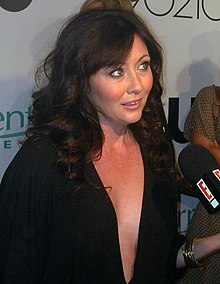Portal:Television
The Television Portal

Television (TV) is a telecommunication medium for transmitting moving images and sound. The term can refer to a television set, or the medium of television transmission. Television is a mass medium for advertising, entertainment, news, and sports.
Television became available in crude experimental forms in the 1920s, but only after several years of further development was the new technology marketed to consumers. After World War II, an improved form of black-and-white television broadcasting became popular in the United Kingdom and the United States, and television sets became commonplace in homes, businesses, and institutions. During the 1950s, television was the primary medium for influencing public opinion. In the mid-1960s, color broadcasting was introduced in the U.S. and most other developed countries.
In 2013, 79% of the world's households owned a television set. The replacement of earlier cathode-ray tube (CRT) screen displays with compact, energy-efficient, flat-panel alternative technologies such as LCDs (both fluorescent-backlit and LED), OLED displays, and plasma displays was a hardware revolution that began with computer monitors in the late 1990s. Most television sets sold in the 2000s were flat-panel, mainly LEDs. Major manufacturers announced the discontinuation of CRT, Digital Light Processing (DLP), plasma, and even fluorescent-backlit LCDs by the mid-2010s. LEDs are being gradually replaced by OLEDs. Also, major manufacturers have started increasingly producing smart TVs in the mid-2010s. Smart TVs with integrated Internet and Web 2.0 functions became the dominant form of television by the late 2010s. (Full article...)
Selected article -
Selected image -

Early television model, from 1936, produced by Telefunken, Germany
Did you know (auto-generated) -

- ... that CBS executive Laurence Tisch found out on a tennis court in the U.S. Virgin Islands that rival network NBC had bought his company's affiliate station in Miami?
- ... that reporter Bobbie Wygant got her first television show after filling in while its host was sick with the flu?
- ... that the theme song for Guilty's live-action television series is Toshi's first original song in 22 years?
- ... that the day employees of Boston television station WLVI received new business cards, they learned the station would be sold and they would lose their jobs?
- ... that Ernst Jacobi, known for portraying Gauleiter Löbsack in Volker Schlöndorff's film The Tin Drum, played more than 200 roles as a television actor?
- ... that 2 Cheap Cars withdrew a television advertisement in New Zealand because children were copying the main character's catchphrase, "Ah so", which they sometimes pronounced "asshole"?
Selected quote -
More did you know
- ...that The Simpsons' history began when Matt Groening conceived of the dysfunctional family in the lobby of James L. Brooks's office?
- ...that the fight scene between Peter Griffin and a giant chicken on Family Guy episode Blind Ambition was originally created for the episode Cleveland Loretta Quagmire?
- ...that an advertising spot immediately following Xinwen Lianbo, a daily news programme shown by most terrestrial television stations in mainland China, can sell for an estimated US$100,000?
- ...that Tomorrow's Pioneers, a television program for children produced by Hamas, features a mascot similar to Mickey Mouse?
- ...that the Zambian district of Chiengi has no television or telephone service?
Selected biography -
Jacob Benjamin Gyllenhaal (/ˈdʒɪlənhɔːl/ JIL-ən-hawl, Swedish: [ˈjʏ̂lːɛnˌhɑːl]; born December 19, 1980) is an American actor. Born into the Gyllenhaal family, he is the son of director Stephen Gyllenhaal and screenwriter Naomi Foner, and the younger brother of actress Maggie Gyllenhaal. He began acting as a child, making his acting debut in City Slickers (1991), followed by roles in his father's films A Dangerous Woman (1993) and Homegrown (1998). His breakthrough roles were as Homer Hickam in October Sky (1999) and as a psychologically troubled teenager in Donnie Darko (2001).
Gyllenhaal starred in the 2004 science fiction disaster film The Day After Tomorrow. He played Jack Twist in Ang Lee's 2005 romantic drama Brokeback Mountain, for which Gyllenhaal won a BAFTA Award and was nominated for an Academy Award. His career progressed with starring roles in the thriller Zodiac (2007), the romantic comedy Love & Other Drugs (2010), and the science fiction film Source Code (2011). Further acclaim came with his roles in Denis Villeneuve's thrillers Prisoners (2013) and Enemy (2013), and he received nominations for the BAFTA Award for Best Actor in a Leading Role for his performances as a manipulative journalist in Nightcrawler (2014) and a troubled writer in Nocturnal Animals (2016). His highest-grossing release came with the Marvel Cinematic Universe superhero film Spider-Man: Far From Home (2019), in which he portrayed Quentin Beck / Mysterio. He has since starred in Wildlife (2018), Velvet Buzzsaw (2019), The Guilty (2021), and Ambulance (2022). (Full article...)General images
News
- December 28: US professional wrestler Jon Huber dies aged 41
- September 2: Tributes paid to recently deceased US actor Chadwick Boseman
- May 24: Japanese professional wrestler and Netflix star Hana Kimura dies aged 22
- January 16: BBC newsreader Alagiah to undergo treatment for bowel cancer
- Upcoming events
Featured content
Main topics
History of television: Early television stations • Geographical usage of television • Golden Age of Television • List of experimental television stations • List of years in television • Mechanical television • Social aspects of television • Television systems before 1940 • Timeline of the introduction of television in countries • Timeline of the introduction of color television in countries
Inventors and pioneers: John Logie Baird • Alan Blumlein • Walter Bruch • Alan Archibald Campbell-Swinton • Allen B. DuMont • Philo Taylor Farnsworth • Charles Francis Jenkins • Boris Grabovsky • Paul Gottlieb Nipkow • Constantin Perskyi • Boris Rosing • David Sarnoff • Kálmán Tihanyi • Vladimir Zworykin
Technology: Comparison of display technology • Digital television • Liquid crystal display television • Large-screen television technology • Technology of television
Terms: Broadcast television systems • Composite monitor • HDTV • Liquid crystal display television • PAL • Picture-in-picture • Pay-per-view • Plasma display • NICAM • NTSC • SECAM
Categories
WikiProjects

|
You are invited to participate in WikiProject Television, a WikiProject dedicated to developing and improving articles about Television. |
- Main projects
- Sub-projects
Television Stations • American animation • American television • Australian television • British TV • BBC • Canadian TV shows • Television Game Shows • ITC Entertainment Productions • Digimon • Buffyverse • Doctor Who • Degrassi • EastEnders • Episode coverage • Firefly • Futurama • Grey's Anatomy • Indian television • Lost • Nickelodeon • The O.C. • Professional Wrestling • Reality TV • The Simpsons • Seinfeld • South Park • Stargate • Star Trek • Star Wars • Soap operas • Avatar: The Last Airbender • House
- Related projects
Animation • Anime and manga • Comedy • Comics • Fictional characters • Film • Media franchises
What are WikiProjects?
Things you can do

- Place the {{WikiProject Television}} project banner on the talk pages of all articles within the scope of the project.
- Write: Possible Possum
- Cleanup: color television, Alien Nation: Body and Soul, The Sopranos, Alien Nation: Dark Horizon, Alien Nation: The Enemy Within, Alien Nation: Millennium, Aang
- Expand: Timeline of the introduction of color television in countries
- Stubs: Flow (television), Just for Kicks (TV series), Play of the Month, Nova (Dutch TV series), More stubs...
Subportals
Related portals
Associated Wikimedia
The following Wikimedia Foundation sister projects provide more on this subject:
-
Commons
Free media repository -
Wikibooks
Free textbooks and manuals -
Wikidata
Free knowledge base -
Wikinews
Free-content news -
Wikiquote
Collection of quotations -
Wikisource
Free-content library -
Wikiversity
Free learning tools -
Wiktionary
Dictionary and thesaurus






























































